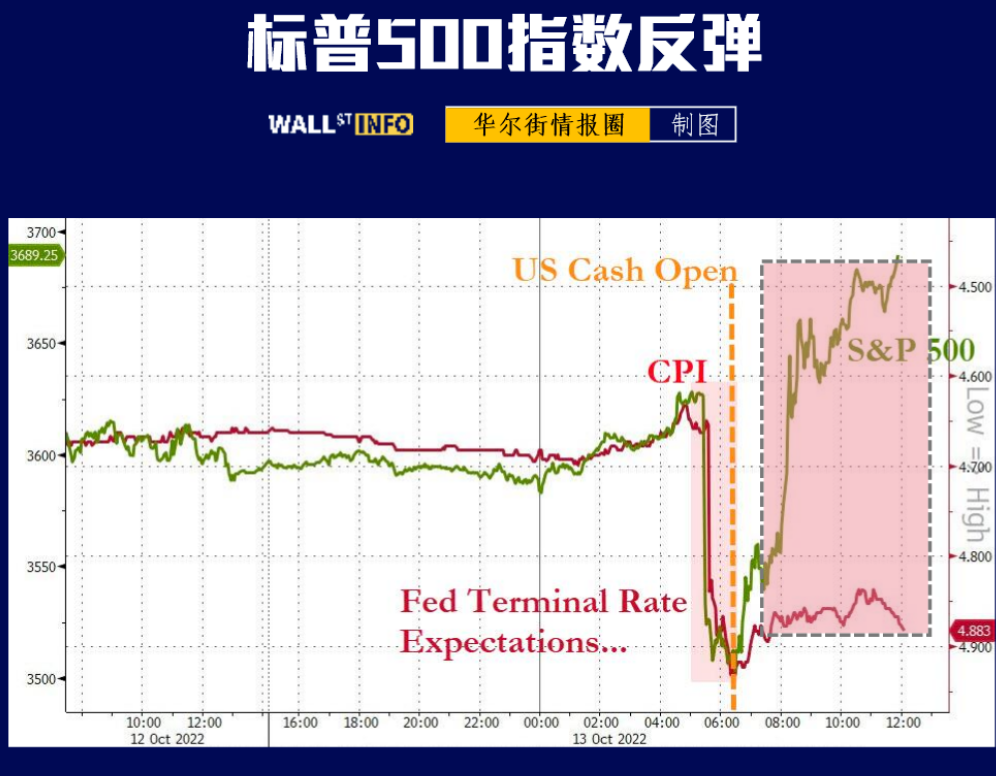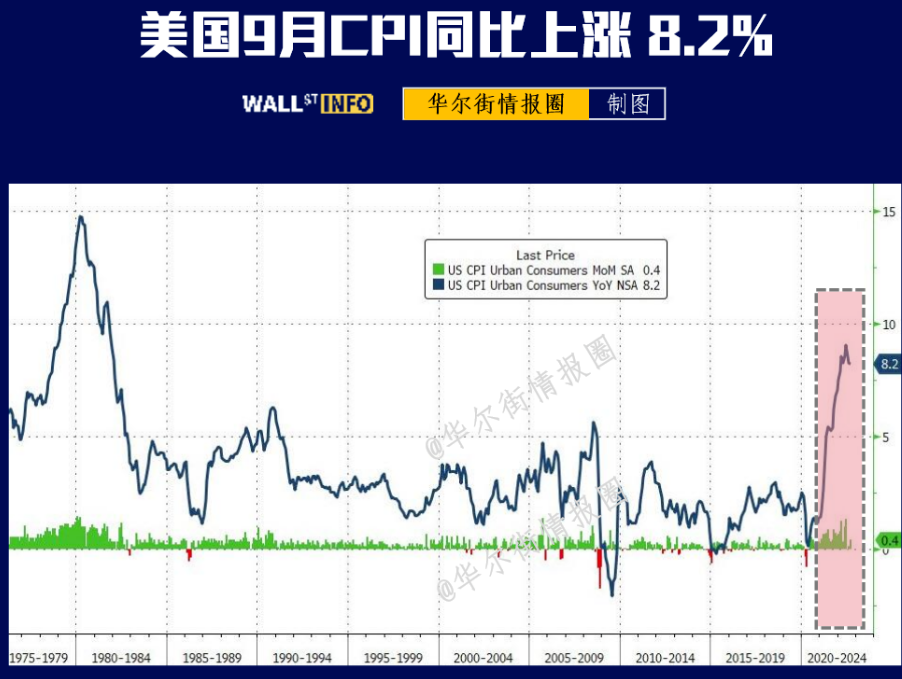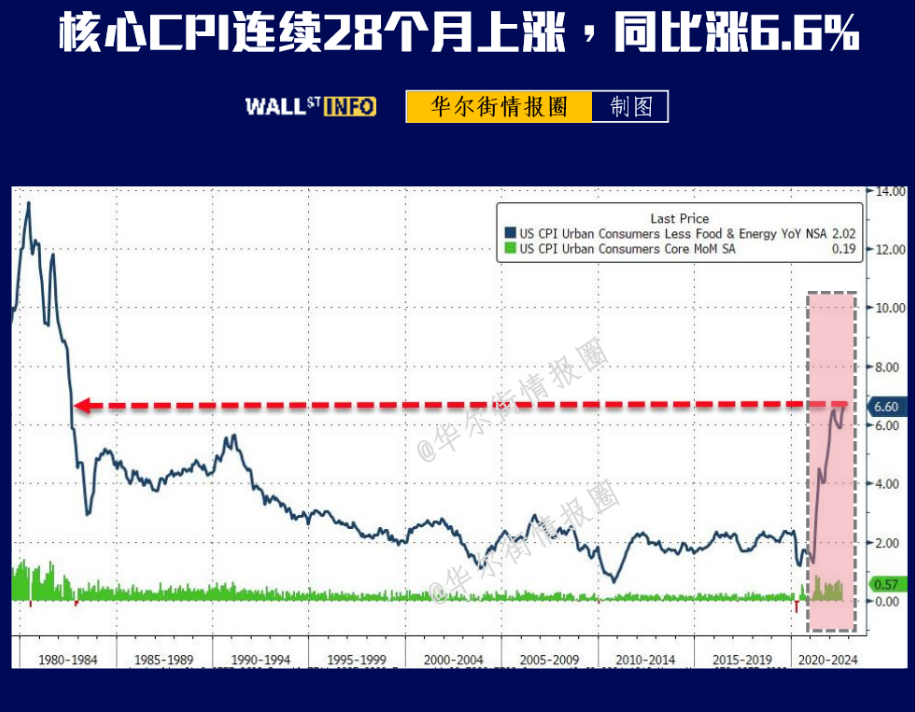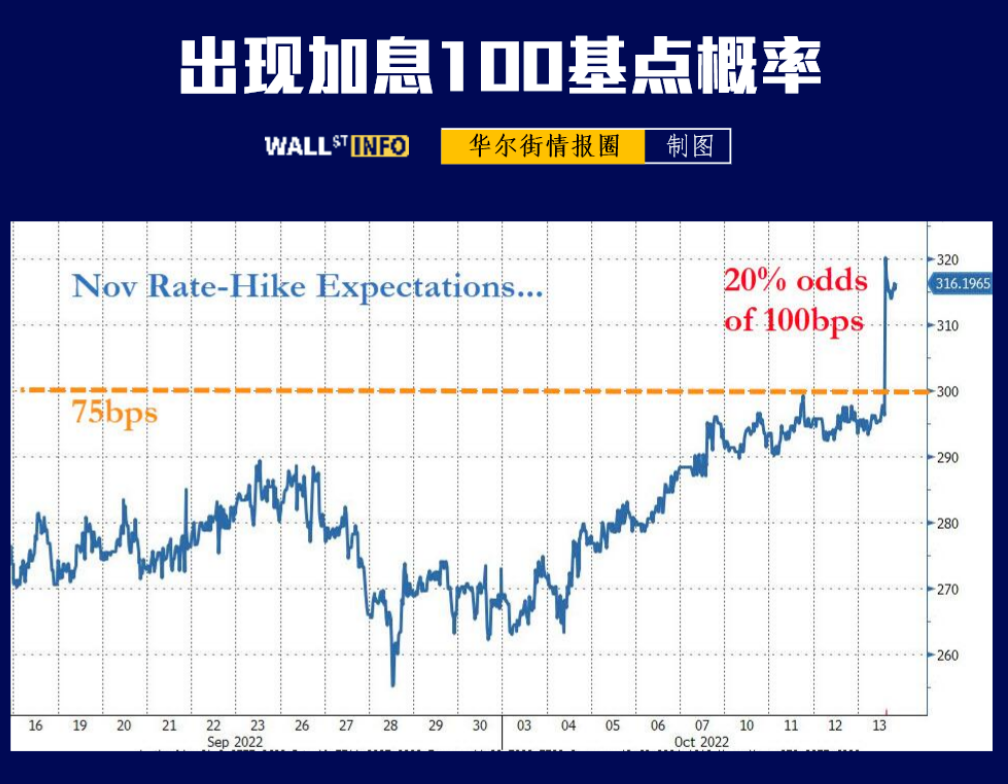Rumor has become the most accurate prediction.
U.S. September CPI and core CPI both exceeded expectations, providing reasons for further sharp interest rate hikes.
-CPI rose from 8.3% to 8.2% in September, which was higher than the 8.1% expected by economists.
-In September, the increase of core CPI accelerated from 6.3% in August to 6.6%, which was higher than the expectation of 6.5% and the highest level since 1982.
Problems reflected by itemized data:
-Housing inflation was 6.59%, higher than last month's 6.24% and a record high.
-Rent inflation was 7.21%, higher than last month's 6.74% and a record high.
Given the time lag between real-time changes in rents and house prices and their reflection in the data, house prices in the inflation report will remain high for quite some time.
The CPI data obviously shocked the market-the US dollar index rose to a two-week high of 113.880, the yield of 10-year US bonds once rose above 4%, and the US stock market plunged.
This is the last inflation report before the Fed's November meeting (the Fed's policies didn't work) and the last report before the mid-term elections in the United States (a disaster for Democrats). Inflation should have slowed, but the results we got are going in the opposite direction. No one in the market believes that the Fed will raise interest rates by less than 75 basis points at the November meeting.
The Fed is under great pressure:
1. The market even expected to raise interest rates by 100 basis points in November (with a possibility of 20%), which may be a fuse. Originally, it was certain to raise interest rates by 75 basis points, but now there is a second possibility, and the Federal Reserve is led by market expectations. The two moved from differences to consensus, separated by a turbulence.
2. What this report really plays a role is the Federal Reserve meeting in December (which upset the established rhythm). It is hard to imagine that the Federal Reserve will slow down the interest rate hike at that time, and the market expects to raise interest rates by 75 basis points in December (that is to say, raise interest rates by 75 basis points five times in a row).
Barclays economists wrote in a note to clients after the data release that they expected to raise interest rates by 75 basis points in both November and December this year and 50 basis points in February next year. At the last three meetings in 2023, it will cut interest rates by 75 basis points.
3. The market forecast for the Fed's "terminal interest rate" rose to nearly 5% for the first time (4.66% before the report was released). Nevertheless, the current interest rate is still far lower than the 5.25% level before the financial crisis began in 2007 (the current interest rate level is 3%-3.25%).

After the CPI data, the US stock market first plummeted and then rose sharply, which was a dazzling day. Not only did the S&P 500 wipe out a 2.4% drop, it closed up 2.6%, reaching 5% for the day. This is the first time since July that the S&P 500 index has erased its intraday decline of over 2%. This has happened six times this year, and it is expected to usher in the craziest year since the financial crisis in 2008.

1. Some people think it is the perfect rebound to touch the technical support level. On the technical chart, the S&P 500 rebounded after falling to a 50% Fibonacci retracement.
2. Some people think that it is caused by the liquidation of option short sellers. When investors profit from put options during an earlier sell-off, they need to close their positions. After that, as the market rebounded, short sellers were forced to close their positions to control losses, a process that only pushed the stock market up.
3. Some people think that the worst has happened, and the market is seriously oversold and bought on dips.
4. Others believe that the early results of the earnings season bring hope to bulls.
Either way, one detail needs to be noted-no Fed officials spoke after the CPI data. On a trading day basis (from the opening of global markets at 6:00 a.m. Beijing time to the closing of global markets at 5:00 a.m. the next day), Fed officials spoke on every trading day this week, except yesterday.
Imagine what Fed officials will say: The Fed will fight inflation firmly (don't even think about it, it will definitely say so, and it can only say so).
Obviously, such remarks will aggravate the decline of the stock market after the CPI data is released. The Federal Reserve has not arranged for officials to speak after the CPI data. It can be seen that the Federal Reserve does not want the stock market to fall into uncontrolled decline and cause panic in the market.
Because this (unstable financial market), the Fed has to go back and relax its policy to save the financial market, which leads to the failure of its efforts to fight inflation. The premise of the Fed's fight against inflation must be that the financial market cannot collapse. Therefore, for the Fed, the stock market can fall, but it can't plummet, at least the decline can't exceed 3% (causing panic). Think again, what would happen if the US stock market didn't rebound in intraday trading? Continue to plummet, and the decline will be uncontrolled (before that, the decline has exceeded 2%).
In addition, we also need to recall that before the CPI data, there were some "troubles" in the market (see yesterday's article "American CPI with worldwide attention, is there an inside story?").
-Wall Street hype "core CPI" will hit a 40-year high, so that the market will continue to prepare for the Fed's radical interest rate hike;
-Nick Timiros, a reporter from the Wall Street Journal who is known as the "New Federal Reserve News Agency", interpreted the minutes of the Fed meeting in the opposite way, warning many Fed officials to raise their expectations for expected interest rate hikes.
In advance, the market has already been vaccinated. It can also be explained from the level that it is no accident that US stocks rebounded from the sharp drop last night.
In fact, this report has not changed much for the Fed, because the Fed has always emphasized the goal of "raising interest rates until inflation drops to 2%", which only reduces the market's thinking of the Fed's turn. This report will only discourage many people from betting on "slowing the pace of interest rate hikes" in the short term, but we think the market may be a little scared.
There will always be a moment when the focus of the market will turn to "the Fed slows down the pace of raising interest rates". With further rate hikes moving into restrictive policy territory and with so many interest rate hikes growing concerns about financial stability, they will become less assertive about the pace of rate hikes. However, there is another contradiction: the Fed has lowered the rate increase-investors think this is a signal to stop raising interest rates or even start cutting interest rates-the stock market may rise sharply-the US financial situation is "from tight to loose"-and the Fed feels the need to raise interest rates sharply again. Therefore, it is very difficult for the Fed to reduce the rate hike for the first time, and a fine-tuning of policy can easily be misread as a "policy turn".
Before "slowing down the interest rate hike", the Fed must do one thing-change the market focus from "how much to raise interest rates at each meeting" to "how much the end rate will reach".
Now we sit down and wait for something to happen.
$E-mini Nasdaq 100 - main 2212(NQmain)$ $E-mini Dow Jones - main 2212(YMmain)$ $E-mini S&P 500 - main 2212(ESmain)$ $Gold - main 2212(GCmain)$ $Light Crude Oil - main 2211(CLmain)$



Comments
Nice share!